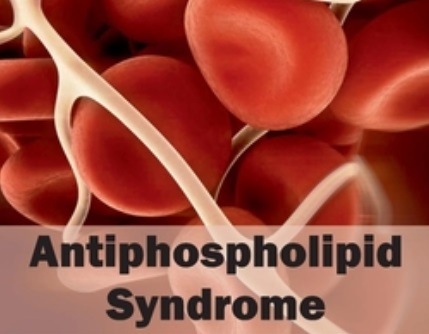Scientists from China Have Identified the Ubiquitin-Proteasome System as a Key Player in Antiphospholipid Syndrome
Nikhil Prasad Fact checked by:Thailand Medical News Team Feb 19, 2025 1 month, 3 weeks, 1 day, 11 hours, 15 minutes ago
Medical News: Antiphospholipid syndrome (APS) is a serious autoimmune disorder that increases the risk of blood clots, pregnancy complications, and chronic inflammation. It is associated with the presence of antiphospholipid antibodies (aPLs) that mistakenly attack proteins in the blood. These antibodies lead to excessive clotting, which can result in life-threatening conditions such as strokes, deep vein thrombosis, and recurrent miscarriages. Scientists have been exploring new ways to manage this complex condition, and recent research has identified the ubiquitin-proteasome system (UPS) as a potential key player in APS development and treatment. This
Medical News report delves into the latest findings that highlight how the UPS could be both a driver of APS progression and a promising target for future therapies.
 Scientists from China Have Identified the Ubiquitin-Proteasome System as a Key
Scientists from China Have Identified the Ubiquitin-Proteasome System as a Key
Player in Antiphospholipid Syndrome
The Role of the Ubiquitin Proteasome System in APS
Researchers from Peking University Third Hospital and the Institute of Medical Technology at Peking University Health Science Center, China, have uncovered the intricate role of the ubiquitin-proteasome system in APS. The UPS is a fundamental system in the body responsible for regulating protein degradation, ensuring that damaged or unnecessary proteins are broken down and removed efficiently. However, when this system becomes imbalanced, it can contribute to disease development by disrupting the normal function of immune cells, endothelial cells (which line blood vessels), and platelets.
The study highlights that in APS, the UPS is involved in amplifying inflammatory responses and promoting clot formation. The presence of aPLs in APS patients activates a chain reaction in immune cells, leading to increased production of inflammatory proteins. This overactive immune response damages blood vessels, causing them to become prone to clotting. Researchers have also found that proteasome inhibitors - compounds that block the degradation of proteins - can help reduce inflammation and prevent blood clot formation in APS models.’
Potential for Targeting the UPS in APS Treatment
The findings suggest that targeting the UPS could be a revolutionary approach to treating APS. Currently, APS treatment focuses on blood thinners like aspirin and anticoagulants to reduce clotting risks. However, these treatments do not address the underlying immune dysfunction in APS patients. The research team found that low-dose proteasome inhibitors could effectively suppress the excessive inflammatory response seen in APS by reducing the production of harmful cytokines - proteins that fuel inflammation.
One of the key discoveries in the study is the link between the UPS and NF-kB, a central regulator of inflammation and blood clot formation. NF-kB activation is significantly elevated in APS patients, leading to increased expression of tissue factor, a protein that promotes clotting. By inhibiting the UPS, researchers observed a reduction in NF-kB activity, which in turn decreased inflammation and clot formation.
&
lt;br />
UPS and Pregnancy Complications in APS
APS is a leading cause of pregnancy loss, as aPLs interfere with the normal function of trophoblast cells, which are crucial for embryo implantation and placenta formation. The study found that UPS dysfunction in these cells leads to a cascade of harmful effects, including decreased cell migration and increased inflammation at the maternal-fetal interface. By targeting specific proteins within the UPS, researchers believe it may be possible to restore normal trophoblast function and improve pregnancy outcomes for women with APS.
Additionally, the study highlights the role of specific proteins within the UPS that regulate the stability of inflammatory and clotting-related factors. For instance, E3 ubiquitin ligases and deubiquitinases (DUBs) have been found to either amplify or suppress APS-related inflammation and clot formation. Understanding these interactions opens new doors for targeted drug development.
Future Implications and Research Directions
The discovery of the UPS as a central player in APS could transform the way this condition is treated. Current therapies, such as anticoagulants, only address symptoms, whereas targeting the UPS may offer a way to directly control the disease at a molecular level. Future research will focus on developing drugs that selectively inhibit or enhance specific components of the UPS to create more effective and safer treatment options for APS patients.
Researchers also suggest that UPS-based therapies could be combined with existing treatments to provide a more comprehensive approach to APS management. Proteasome inhibitors are already used in cancer treatments, and adapting these drugs for autoimmune diseases like APS could be a promising next step.
Conclusion
The study sheds new light on the role of the ubiquitin-proteasome system in APS, revealing its involvement in immune dysfunction, inflammation, and clot formation. By targeting this system, scientists may develop novel therapies that go beyond traditional anticoagulants and address the root causes of APS.
Although further clinical trials are needed, these findings offer hope for improved treatments that could significantly enhance the quality of life for APS patients.
The study findings were published in the peer-reviewed journal: Frontiers in Immunology.
https://www.frontiersin.org/journals/immunology/articles/10.3389/fimmu.2025.1523799/full
For the latest on Antiphospholipid Syndrome, keep on logging to Thailand
Medical News.
Read Also:
https://www.thailandmedical.news/news/more-than-50-percent-of-individuals-exposed-to-covid-19-will-develop-antiphospholipid-autoantibodies
https://www.thailandmedical.news/news/a-clinical-overview-of-antiphospholipid-syndrome
https://www.thailandmedical.news/news/covid-19-can-cause-an-autoimmune-related-blood-complication-known-as-antiphospholipid-syndrome
https://www.thailandmedical.news/news/u-s-nih-study-finds-that-sars-cov-2-induced-antiphospholipid-antibodies-causes-endothelial-cell-activation-and-dysfunction-leading-to-severe-covid-19-
https://www.thailandmedical.news/pages/thailand_doctors_listings
